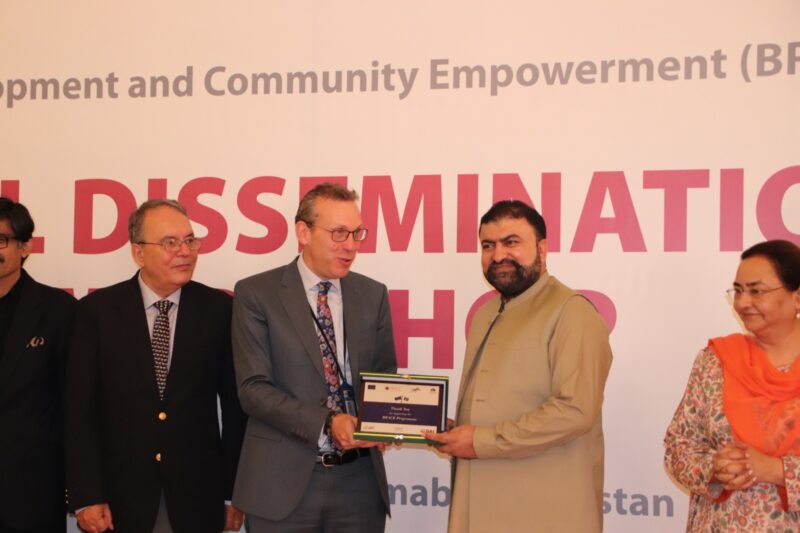ISLAMABAD: A six-year European Union funded Balochistan Rural Development and Community Empowerment (BRACE) program concluded with a final dissemination workshop organised by Rural Support Programmes Network.
BRACE was the largest EU investment (Euro 45 million) for community empowerment in Balochistan, directly working with 300,000 households in 10 districts.
The EU-funded program was implemented by the Rural Support Programs Network (RSPN), Balochistan Rural Support Program (BRSP) and National Rural Support Program (NRSP) encompassing one-third of Balochistan.
The Program mobilized 300,000 households, half of which were categorized as economically disadvantaged. The initiative established a cohesive network of approximately 26,375 Community Organisations, 5739 Village Organisation and 237 Local Support Organisations across ten districts namely Jhal Magsi, Kech, Khuzdar, Killa Abdullah, Chaman, Loralai, Pishin, Washuk, Duki and Zhob in Balochistan.
The program was implemented in collaboration with the Local Government and Rural Development Department (LGRDD), Government of Balochistan, (GoB).
The final dissemination workshop was presided by the Minister for Interior Sarfaraz Bugti, who himself hails from Balochistan.
Jeroen Willems, the head of Cooperation of the European Union Delegation to Pakistan, reiterated EU commitment to supporting the vulnerable communities in the Balochistan province.
These communities, grappling with the adverse effects of climate change, surging inflation, and persistently low human development indicators, are at the forefront of the EU’s assistance efforts.
“The EU firmly believes in the values of inclusivity, accountability, and sustainability, placing great importance on the active engagement of local communities, civil society organizations, and marginalized groups in decision-making processes.
“I am happy that the programme has strengthened communities, rebuilt much needed rural infrastructure, enhanced human capital and helped create livelihood opportunities’.
“BRACE Program provided Technical & Vocational Education and Trainings to 3,187 youngsters, 58% of them women. 51% of these skilled graduates have pulled their families out of poverty”.
Speaking on the occasion, Zahoor-ul-Hassan Shay, Secretary Balochistan Local Government Board, admired the work of RSPN and implementing RSPs in organising communities. He thanked the European Union for its continued support to in building climate resilient communities.”
Mr Shay highlighted the need for continued support to the Balochistan government in its mission to strengthen its local governance systems now that the province has promulgated its Community Led Local Governance (CLLG) Policy, paving the way for community’s engagement in planning and implementation of development schemes at the village level”.
The program mobilized 300,000 households, half of which were categorized as economically disadvantaged.
The initiative established a cohesive network of approximately 26,375 Community Organisations, 5739 Village Organisation and 237 Local Support Organisations across ten districts namely Jhal Magsi, Kech, Khuzdar, Killa Abdullah, Chaman, Loralai, Pishin, Washuk, Duki and Zhob in Balochistan.
The program was implemented in collaboration with the Local Government and Rural Development Department (LGRDD), Government of Balochistan, (GoB).
Mr Jeroen Willems, the Head of Cooperation of the European Union Delegation to Pakistan reiterated EU commitment to supporting the vulnerable communities in the Balochistan province.
These communities, grappling with the adverse effects of climate change, surging inflation, and persistently low human development indicators, are at the forefront of the EU’s assistance efforts.
“The EU firmly believes in the values of inclusivity, accountability, and sustainability, placing great importance on the active engagement of local communities, civil society organizations, and marginalized groups in decision-making processes.
“I am happy that the programme has strengthened communities, rebuilt much needed rural infrastructure, enhanced human capital and helped create livelihood opportunities’.
Shandana Khan, CEO of RSPN, highlighted that women made majority of the beneficiaries across all programme interventions.
“The most visible legacy of this programme that I am proud of is that we have evidence through third-party that women have a larger role as decision-makers in their own households”, she added.
Several community leaders from Balochistan also presented their achievements. An LSO representative from Loralai shared how the programme motivated him to advocate for girls’ education in his area.
Ms Samreen Baloch, a community leader from Turbat said that all financial services such as Income Generating Grants and interest-free loans were 100% directed to women.
“Community Investment Fund: Through people’s union council based organisations, PKR 408 million has been provided to 14,714 poor community members, 62% of them women”.


Comments are closed.